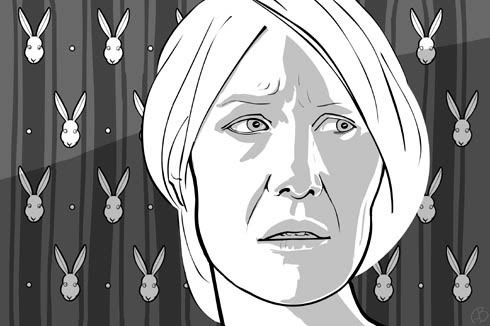Outlandish Empire

by Ryland Walker Knight
In the beginning, David Lynch went to art school to paint, and movies were an afterthought. Now, movies are everything. By the end of its 172 minutes, Lynch’s newest film, INLAND EMPIRE, lays down for viewers an explicit claim: We use movies to build our lives, our dreams and enact fantasies, idealized and horrific alike. The film is rooted in Hollywood (visually name-checked twice), yet its aim is not to skewer. If anything, it’s a celebration of the possibilities of the movies.
As is a beast, INLAND EMPIRE is unruly. It may provide an answer to Andre Bazin’s critical imperative, “What is cinema?”, but that answer is entirely present-tense, rooted here and now in our 21st century (cinema’s second). And it starts with the medium itself, digital video. Yet this is not a pristine, candy-colored DV like Superman Returns, but a handheld, grain-heavy DV captured by a “prosumer” camcorder; the images are both buoyant and cumbersome. This may, in the end, prove too much for casual viewers, but if you can let go any aesthetic (or personal) ties to emulsified film, you can see how the digital blur bleeds whites and hot tones much as a painter would blend colors. The look will aggravate you at first—some actors are flatly kept out of focus—but as you proceed and find a rhythm with this wild brutality, you wind up seeing the beauty in the murky, dank world onscreen.
The choice to shoot on video frees the film to embrace any surreal tangent, and they abound. In fact, they build the narrative, if you want to call it that; if you don’t, call it a fiction, à la Borges. Laura Dern plays Nikki Grace, a successful actress newly cast in a banner film called “On High in Blue Tomorrows”. Her co-star is Devon Berk (lady-killer Justin Theroux) and their director is Kingsley Stewart (an unflappable yet off kilter Jeremy Irons). But all exposition is quickly swept aside once shooting begins and Nikki starts seeing herself in her meta-movie alter-ego, Susan, and, of course, vice-versa, beginning the freefall into, yes, the INLAND EMPIRE.
Cinema, at its best, is a poetic art, one which not only reflects our reality but refracts it through a prism of assembled images and choreographed sounds. That doesn’t preclude linear movies, though, as there are many poetic forward-motion narrative films, including Lynch’s own The Straight Story. INLAND EMPIRE, though, is anything but linear and wholly surreal—quite legitimately the opposite of The Straight Story’s brevity. By embracing multiplicity, one of Lynch’s strong suits, there’s no single answer to “What’s going on?” or “What is cinema?” to be found here. What can be found is a wonderland of right and left turns, bitch-slapping, whores, low-life con artists, a byzantine network of hallways populated by doorways leading who-knows-where?, dreams, lusty songs that menace under the titillation, cinema, blood & guts, dirty blondes and busty brunettes, subtitles and man-sized rabbits. Enter the maze if you dare: you won’t come out the same, but you will re-emerge.
INLAND EMPIRE tied my throat into a knot that has yet to let loose. It’s not a clarity his art provides: this film reaches out, through the screen, with two hands plunging into your chest, massaging your beating heart. This is felt in the film’s opening shot: a projector’s beam illuminates the all-caps title, which then bleeds into a close-up of a needle on a record, tying image and sound together. The film is an exaltation, an orgasm, a little scary death celebrating the multivalent mysteries of life. Any worthwhile art should grab your hand, take you into the looking glass, and point your eyes around.
[The review is supposed to be available here but The Daily Californian's website is mostly unreliable. Big ups to Aaron Bothman on the illustration!]
02006: 172 minutes: dir. David Lynch: written by Lynch




Well, that last sentence definitely took me by the hand. Rousing love letter, man.
ReplyDeleteYour article makes it hard for me to wait for the DVD for my reappraisal, since Inland is still playing New York. Damn you.
Thanks, dude. What's funny is they added the word "forward" which connotates something very different than the rest of the article, I thought, which was all about the proliferations: I don't want art to point my eyes foreward so much as left, right, back, up, down, all around. I understand the journalistic aversion to "literary" ambiguity but I just wish they'd consulted me about it. That said, it's fine, and I understand why the editors felt it a necessary add; I'm just an autocratic control freak when it comes to my darlings (words). (SIMPLY: there's another essay to be written.)
ReplyDeleteBut yeah... maybe you should head on downtown sometime... give it a shot all big and bad and beautiful again... if I was there, I'd drag you. I'm fairly certain I'll go this weekend for a third (& 4th?) time.
Also, thinking about it some more, and at the egging on of Coffeen, I, too, think it's much more radical than simply "using" movies to build life: for Lynch, movies ARE life.
ReplyDeleteGreat review, RWK. Keep 'em comin'!
ReplyDeleteThe film is an exaltation, an orgasm, a little scary death celebrating the multivalent mysteries of life. Any worthwhile art should grab your hand, take you into the looking glass, and point your eyes around but seems the movie have some fails during it, but the movie always get you in suspense so that mistakes pas unnoticed.
ReplyDeleteExcellent post, I think you're doing an important contribution. The majority of the film’s first act takes place in Los Angeles, California. A film actress named Nikki Grace (Laura Dern) has landed a role that will mark her comeback. 23jj
ReplyDelete